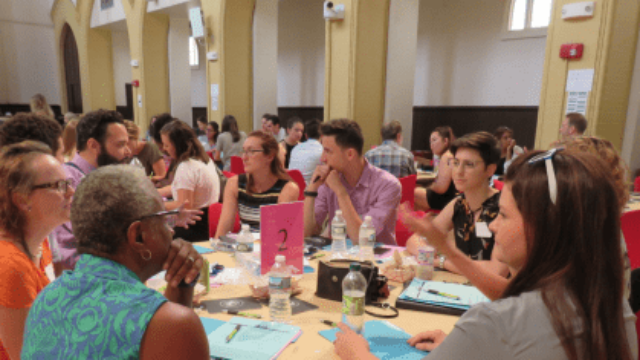Service-Learning

A full list of Northeastern service-learning courses available by semester is available on the service-learning website. Many of the Dialogue of Civilizations faculty-led summer programs also integrate service-learning into their curricula.
Students also have valuable opportunities to broaden their knowledge, skills, and social awareness by volunteering in the community outside of their academic curriculum. The Northeastern Center of Community Service serves as a clearinghouse for service opportunities through its own programs and events, and partnerships with more than 225 community-based agencies and programs.
The Department of Philosophy and Religion offers a wide range of courses that have incorporated service learning.
PHIL 1180 Environmental Ethics
Focuses on a current ecological crisis and addresses the values that underlie our concern over this crisis, whether the values at issue are anthropocentric or biocentric. Explores the ethical implications these ecological concerns have for our individual lifestyles, and for our role as members of communities.
PHIL 1185 The Ethics of Food
Introduces the ethics of food. Elucidates a wide range of ethical issues associated with food production, processing, distribution, and consumption. Offers students an opportunity to develop skills in ethics and values analysis that can be applied to evaluate food-related practices and policies. Includes topics such as the ethics of different food systems, genetically modified crops, meat eating, hunting, food security, food justice, sustainability, synthetic meat, food advertising, food safety, and foodie culture.
PHIL 2143 Philosophy for Children
Explores big questions in philosophy—how should one conduct oneself, what does it mean to know something, are there object values in an aesthetic domain such as art? Offers students an opportunity to learn methodologies and tools of philosophical inquiry and apply them to works of children’s literature in order to be able to facilitate philosophical discussions in the elementary school classroom. Emphasizes creating a community of inquiry and learning how to devise and communicate different answers to philosophical questions at the elementary level. Students develop lesson plans to help engage young children in philosophical discussion and reflection.
PHIL 3000 Interdisciplinary Methods for PPE
Trains students in interdisciplinary use of the tools of the three disciplines constituting the PPE major: Philosophy, Political Science and Economics. Through guest lectures, discipline specific research, course lecture and discussion, and a service learning opportunity that accompanies the duration of the course, students are exposed to the evaluative process through the lens of each of the disciplines that comprise the PPE major. Facilitates both an appreciation for each discipline and the value of their combination with respect to the evaluation and solution of a social issue.